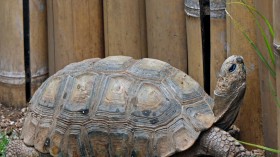Nearly a third of the world's cacti are facing the threat of extinction from illegal trade and other human intrusions, making the flowering desert plants more threatened than mammals and birds, according to researchers from the International Union for Conservation of Nature (IUNC).
Cacti are a vital food and water resource for desert wildlife ranging from bees, to lizards and coyotes. Animals and insects aren't the only ones that rely on the plants for their nutritional value; more than half of the species are used by humans as decorative flowers, food or medicine, according to a recent study.
However, the largest contributor to the decline of cacti populations is illegal trade. After examining 1,478 of the 1,480 living cactus species, researchers concluded that 47 percent of threatened species are affected by illegal trade of live plants and seeds for the horticultural industry and private collections.
"These findings are disturbing," Inger Andersen, IUCN Director General, said in a news release. "They confirm that the scale of the illegal wildlife trade – including trade in plants – is much greater than we had previously thought, and that wildlife trafficking concerns many more species than the charismatic rhinos and elephants which tend to receive global attention. We must urgently step up international efforts to tackle the illegal wildlife trade and strengthen the implementation of the CITES Convention on International Trade in Endangered Species, if we want to prevent the further decline of these species."
As a result of illegal trade, cacti are often taken from the wild and exported to Europe and Asia where they are sold for up to $1,000 per plant, according to The Guardian. Regulating cacti smugglers is often very difficult, since the plants can be sneakily transported in suitcases.
The study, recently published in the journal Nature Plants, sheds light on the need for better and more sustainable management of cactus populations.
For more great nature science stories and general news, please visit our sister site, Headlines and Global News (HNGN).
-Follow Samantha on Twitter @Sam_Ashley13
© 2024 NatureWorldNews.com All rights reserved. Do not reproduce without permission.





